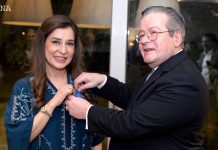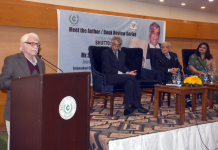DNA
June 13, 2024 Islamabad: The “Future of Women in Energy” Scholars Program, an initiative of the U.S. Pakistan Women’s Council (USPWC) in support of the U.S. – Pakistan “Green Alliance” Framework concluded its third consecutive year this summer.
This year, the program hosted a group of 18 brilliant and diverse young women pursuing bachelor’s degrees in science or engineering in Pakistan. At Texas A&M University (TAMU) Qatar campus, these 18 scholars completed rigorous academic coursework on topics such as fossil energy, wind energy, solar energy, and nuclear energy, conducted laboratory experiments, and engaged in open discussion with leaders and alumnae in the energy sector. They also had the opportunity to experience rich cultural activities in Doha, Qatar.
Supported by the U.S. Department of State, Texas A&M University in Qatar (TAMUQ), the Department of Energy, USAID, and U.S. Embassy Islamabad, the program aims to increase the number of women serving in Pakistan’s vital energy sector.
Upon returning to Pakistan, the energy scholars visited public and private sector energy companies at which they learned about Pakistan’s energy infrastructure.
To encourage the energy scholars to put their knowledge into action, they will undertake internships at some of Pakistan’s leading energy firms.
At the program’s graduation ceremony, USAID Deputy Mission Director, Maura O’Brien congratulated the participants at the graduation ceremony stating, “You are exceptional individuals with a significant task ahead. You won’t just benefit from a more inclusive and sustainable energy sector, you are also key emerging leaders in creating it.”
These graduates will now join a group of 54 prestigious program alumni. Previous participants have secured jobs in Pakistan’s energy sector, received competitive scholarships for graduate level studies, and are pursuing entrepreneurial ventures.
The U.S.–Pakistan “Green Alliance” Framework bolsters bilateral collaborations in agriculture, clean energy, and water management.


















